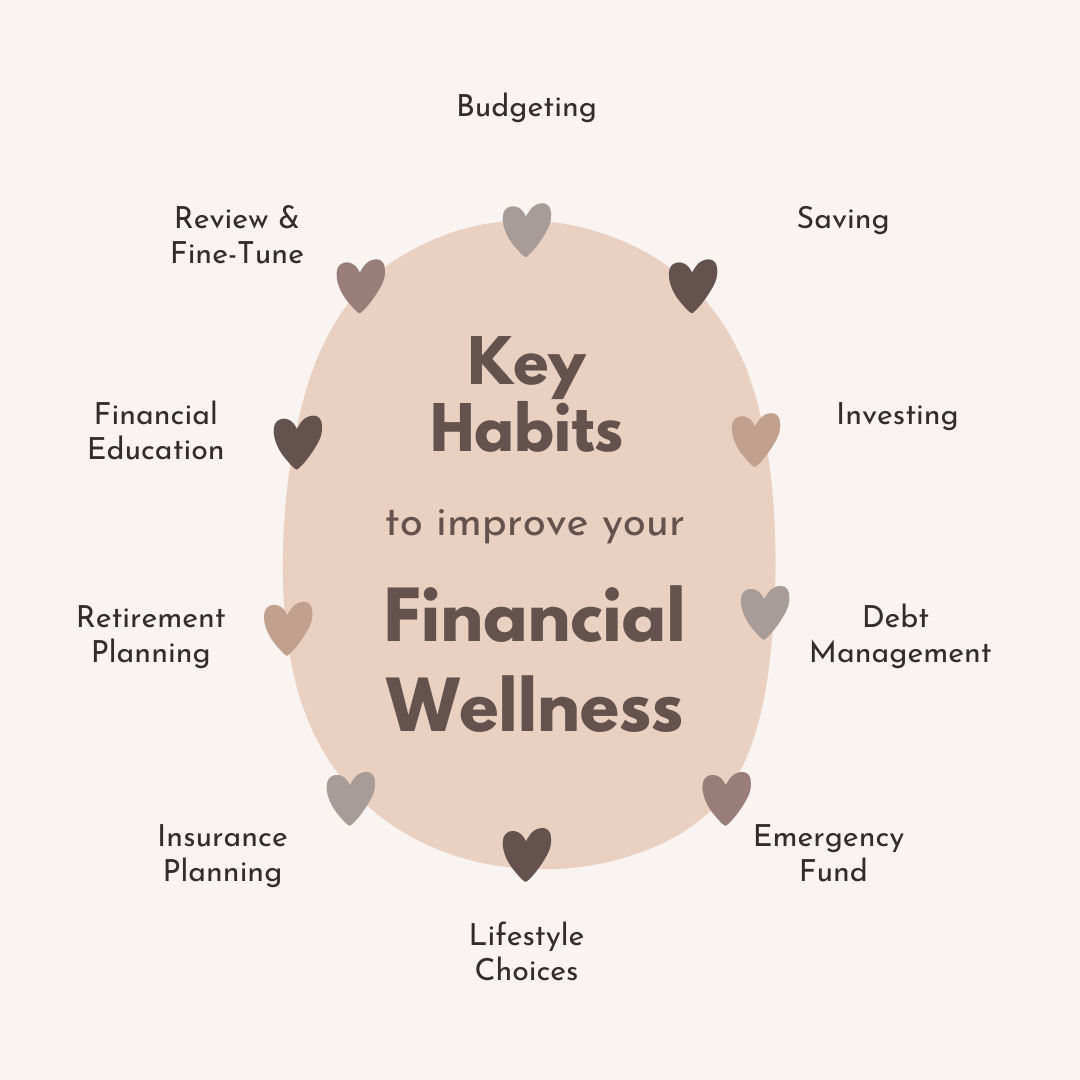Financial wellness is feeling confident and secure about your financial situation. It’s managing money to meet needs and goals, reducing financial stress. It’s about gaining the knowledge and confidence to make informed decisions about your money, whether it’s spending, saving, investing, or protecting your assets. It encompasses various disciplines that collectively contribute to one’s overall financial health and stability.
Financial freedom is available to those who learn about and work for it – Robert Kiyosaki
Key Components of Financial Wellness
Budgeting
A budget forms the cornerstone of financial wellness, functioning as a roadmap to monitor income and expenses. It enables identification of areas for potential savings and allocation towards savings goals and future aspirations. By adhering to a budget, individuals gain clarity on cash flow dynamics and sidestep unnecessary expenditures. This disciplined approach empowers informed financial decision-making and fosters proactive money management, fostering control over personal finances.
Saving and Investing
A solid base of savings and investments is the foundation of financial security. Having an emergency fund might help you deal with unforeseen expenses like medical costs or job loss. When you retire, having a solid retirement plan guarantees you’ll be able to continue living the way you want. Additionally, looking into investing possibilities enables you to achieve your long-term financial objectives, like home ownership or child education, by gradually increasing your wealth.
Debt Management
While financing large purchases like a house or car can be done using debt, it’s crucial to know the many kinds of debt and how they affect your financial situation. Credit card debt is an example of high-interest debt that may easily get out of control and become a significant burden. Conversely, low-interest debt might be a calculated approach to securing your future, such as a student loan used to finance further study. One of the most important steps towards financial wellbeing is making a debt payback plan that gives priority to high-interest loans and clearly outlines the timetable for debt elimination. Maintaining your credit utilisation ratio and paying your bills on time are important ways to establish good credit.
Emergency Fund
An emergency fund is crucial for financial stability. It’s a dedicated pool of money saved for unexpected expenses like medical bills or job loss. This safety net prevents reliance on credit cards or loans during crises. By having readily available cash, you can handle financial setbacks without jeopardizing long-term goals. This provides peace of mind and allows for strategic financial decisions. Ultimately, an emergency fund is a safeguard against life’s uncertainties, promoting overall financial resilience.
Lifestyle Choices
Long-term financial stability is mostly dependent on making deliberate financial decisions on a daily basis. This entails cutting back on wasteful spending, living within your means, and giving necessities priority over wishes. This kind of deliberate money management lays a strong basis for your future financial security. It guarantees you can reach your financial goals stress-free and that you’re ready for unforeseen costs. By fostering resilience and financial discipline, these strategies help you deal confidently with changes in the economy. In the end, prudent lifestyle decisions play a major role in sustaining a stable and equitable financial future throughout time.
Insurance Planning
Think of insurance as a financial airbag. It cushions the blow from unexpected events like accidents, illnesses, or disabilities. Health, life, and disability insurance can pay for medical bills, replace lost income, and ease other financial burdens. This keeps your finances stable during difficult times and gives you peace of mind.
Retirement Planning
Early retirement planning is essential to attaining financial independence in later life. Through consistent contributions to retirement accounts, like retirement savings plans or retirement accounts, people can accumulate significant savings over time. By taking a proactive stance, retirement fund growth and compounding are maximised through investments. Aside from flexibility and peace of mind, early planning guarantees that people can continue living the way they want to when they retire from the workforce. It’s a calculated move that will help ensure a secure and happy retirement.
Financial Education
Financial education is your money’s best friend. Learning about budgeting, investing, taxes, and financial planning empowers you to make smart money decisions. It’s like having a roadmap to your financial goals. By understanding how money works, you can increase your savings, reduce debt, and build a secure financial future. Knowledge is power when it comes to managing your money.
Review and Fine-Tune
Regularly reviewing and adjusting your financial plan is essential to achieving and maintaining your financial goals. By consistently evaluating your income, expenses, and life circumstances, you can ensure that your financial strategy remains effective and aligned with your objectives. This proactive approach allows you to adapt to changes such as fluctuations in income, unexpected expenses, or new financial goals. It also enables you to optimise savings, investments, and debt management strategies as needed to stay on track. Regular reviews empower you to make informed decisions and maintain financial stability, supporting your long-term financial well-being and security.
By consistently engaging in these practices, people can achieve and maintain financial wellness, which promotes more stability, security, and mental clarity in their financial situations. People can establish a solid financial foundation by following guidelines like creating an efficient budget, saving and investing sensibly, and handling debt sensibly. This foundation is further strengthened against unforeseen costs and losses by creating an emergency fund and obtaining sufficient insurance coverage. Attending to continuous financial education and revising financial plans on a regular basis guarantees flexibility in response to shifting objectives and conditions. In the end, these techniques enable people to attain long-term financial well-being and confidently handle the financial challenges of life.

